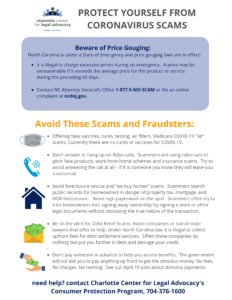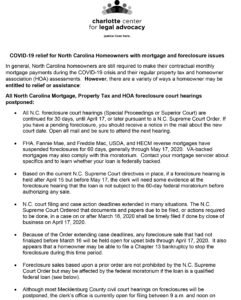Updated March 11, 2021. Originally posted April 6, 2020
IMPORTANT Notice:
On March 11th, 2021 President Biden signed a the American Rescue Plan that included additional $1400 stimulus checks per eligible individual.
Learn more about the third payments and the American Rescue Plan here.
If you have questions about your stimulus payments, contact Charlotte Center for Legal Advocacy by calling 980-202-7329.
Many people anticipate receiving the CARES Act’s Economic Impact Payments (Stimulus Checks). Charlotte Center for Legal Advocacy wants to make sure you have the information you need to know what to expect and how to get your payment.
Anyone in need of other assistance from Charlotte Center for Legal Advocacy can contact us by calling 704-376-1600 (Mecklenburg County), 800-438-1254 (Outside Mecklenburg County) or 800-247-1931 (Linea de Español).
Who is eligible for the payment?
Tax filers with adjusted gross income up to $75,000 for individuals
and up to $150,000 for married couples filing joint returns will receive the
full payment.
For filers with income above those amounts, the payment amount is reduced by $5 for each $100 above the $75,000/$150,000 thresholds. Single filers with income exceeding $80,000 and $160,000 for joint filers with no children are not eligible.
Eligible taxpayers who filed tax returns for either 2020 or 2019 will automatically receive an economic impact payment of up to $1,400 for individuals or $2,800 for married couples. Households also receive $1400 for each qualifying dependent.
Will the IRS take my payment if I have outstanding IRS debts, federal student loans or other government debts?
No. As with second-round checks, third stimulus checks will not be reduced to pay child support arrears either.
How will the IRS calculate my payment?
The American Rescue Plan provides that if your 2020 tax return is not filed and processed by the time the IRS starts processing your third stimulus payment, the tax agency will use information from your 2019 tax return. If your 2020 return is already filed and processed when the IRS is ready to send your payment, then your stimulus check eligibility and amount will be based on information from your 2020 return.
If your 2020 return is filed and/or processed after the IRS sends you a stimulus check, but before July 15, 2021 (or September 1 if the April 15 filing deadline is pushed back), the IRS will send you a second payment for the difference between what your payment should have been if based on your 2020 return and the payment sent based on your 2019 return.
Most people do not need to take any action. The IRS will calculate and automatically send the payment to those eligible.
How will the IRS know where to send my payment?
The economic impact payment will be deposited directly into the same banking account reflected on your tax return filed.
The IRS does not have my direct deposit information. What can I do?
The IRS has an online portal, Get My Payment, for individuals to:
- Check their payment status
- Confirm their payment type: direct deposit or check
- Enter their bank account information for direct deposit if the IRS doesn’t have their direct deposit information and the IRS hasn’t sent their payment yet
Taxpayers only need a few
pieces of information to quickly obtain the status of their payment and, where
needed, provide their bank account information. Having a copy of their most
recent tax return can help speed the process.
For taxpayers to track the
status of their payment, this
feature will show taxpayers the payment amount, scheduled delivery date by
direct deposit or paper check and if a payment hasn’t been scheduled. They will
need to enter basic information including:
- Social Security number
- Date of birth, and
- Mailing address used on their tax return.
Taxpayers needing to add
their bank account information to speed receipt of their payment will also need to
provide the following additional information:
- Their Adjusted Gross Income from their most recent tax return submitted, either 2020 or 2019
- The refund or amount owed from their latest filed tax return
- Bank account type, account and routing numbers
Get My Payment cannot update bank account information after an Economic
Impact Payment has been scheduled for delivery. To help protect against
potential fraud, the tool also does not allow people to change bank account
information already on file with the IRS.
Is providing bank account information to the IRS when paying your tax filing liability good enough?
No, people who paid electronically are going to have to input deposit account information. Go to Get My Payment.
When will payments begin?
Taxpayers with direct deposit information on file with the IRS should see their payment in their bank accounts beginning the week of March 15, 2021, while others might have to wait up to five months to receive paper checks or pre-payed debit cards.
What about taxpayers who don’t have bank accounts?
The U.S. Treasury Department and the IRS are working with digital companies and prepaid debit card providers to ensure there are other avenues for those taxpayers get their money quickly.
I receive SS/VA benefits and/or I am not typically required to file a tax return. Can I still receive my payment?
Yes. Individuals who receive Social Security benefits (Social Security retirement, disability income (SSDI), supplemental income (SSI) or Survivors Benefits) or Veterans Affairs benefits (disability compensation, pension or survivors benefits) who didn’t file tax returns in 2020 or 2019 won’t need to file tax returns to receive their payments.
They should receive the additional money just as they would their Social Security or VA benefits. The IRS will use the information provided by the Social Security Administration/VA OR the information you provided with the IRS’ Non-Filers: Enter Your Payment Info to generate the $1,400 Economic Impact Payments. Recipients will get their payment as a direct deposit or by paper check, just as they normally would.
I am not typically required to file a
tax return because I am low-income. Can I still receive my payment?
Yes. The IRS will use information you provided in the IRS’ Non-Filers: Enter Your Payment Info to send you your stimulus payment.
I have not filed my tax return for 2019 or 2020. Can I still receive a payment?
Yes. The IRS urges anyone with a tax filing obligation who has not yet filed a tax return for 2019 or 2020 to file as soon as they can to receive a payment. Taxpayers should include direct deposit banking information on the return. Visit IRS Free File
If I receive SSI or a VA pension will my payment be considered income?
Please note that the Social Security Administration and Department of Veterans Affairs will not consider the payments as income, and the payments are excluded from resources for 12 months.
What about taxpayers with Individual Tax Identification Numbers (ITINs)?
Immigrants with ITINs are not eligible for the $1,200 payments.
What about mixed-status families (SSN valid for employment and ITIN on the same tax return)?
You are eligible for a second stimulus payment for yourself and any dependents you claimed who also have Social Security numbers valid for employment, but not for your spouse. (Mixed-status families who did not receive the first stimulus payment due to the previous restrictions on spouses of people filing with ITINs will now be eligible to get that payment retroactively when they file their 2020 tax return. Read more here.)
I need to file a tax return. How long are payments available?
For those concerned about visiting a tax professional or local community organization in person to get help with a tax return, these economic impact payments will be available throughout the rest of 2021.
Does someone who has died qualify for the payment?
No. A payment made to someone who died before receipt of the payment should be returned to the IRS by following the instructions for repayments. Return the entire payment unless the payment was made to joint filers and one spouse had not died before receipt of the payment, in which case, you only need to return the portion of the payment made on account of the decedent. This amount will be $1,400 unless adjusted gross income exceeded $150,000.
Does someone who is incarcerated qualify for the payment?
Yes. They can claim the payment by filing a simple 2020 tax return. Read more here.
What should I do to return a payment?
You should return the payment as described below.
If the payment was a paper check:
- Write “Void” in the endorsement section on the back of the check.
- Mail the voided Treasury check immediately to the appropriate IRS location listed below.
- Don’t staple, bend, or paper clip the check.
- Include a note stating the reason for returning the check.
If the payment was a paper check and you have cashed it, or if the payment was a direct deposit:
- Submit a personal check, money order, etc., immediately to the appropriate IRS location listed below.
- Write on the check/money order made payable to “U.S. Treasury” and write 2020EIP, and the taxpayer identification number (social security number, or individual taxpayer identification number) of the recipient of the check.
- Include a brief explanation of the reason for returning the payment
What if my spouse or ex-spouse took my payment in 2020?
If so, you may be able to claim your economic impact payment (EIP) as a credit or refund on your 2020 federal tax return.
In many abusive relationships the abuser controls the household’s money and finances. Although the survivor may have agreed to the filing of the tax return that the COVID relief payment was based upon, the abuser may have later refused to pay over the survivor’s share of the payment or the survivor cannot get the payment from the abuser without risking harm or abuse. In other situations, survivors may not have seen or signed the tax return that the COVID relief payment was based upon, or they were forced to sign the return under threats or duress.
IRS procedures outline a path for relief for survivors who believe their COVID relief payments were issued based on a tax return that was fraudulent, forged, or signed by the survivor under duress.
Unfortunately, the IRS has not created procedures for allowing a survivor to receive the Recovery Rebate Credit when both spouses agreed to file a married-filing-joint return, but the abusive spouse refused to pay over the survivor’s share of the COVID relief payment. Advocates for survivors of domestic violence have been working on this issue and continue to do so in an effort to find relief for survivors in this situation.
Follow these steps to receive your payment and get help
Where can I get more information?
The IRS will post all key information on IRS.gov/coronavirus as soon as it becomes available.
The IRS has a reduced staff in many of its offices but remains committed to helping eligible individuals receive their payments expeditiously. Check for updated information on IRS.gov/coronavirus rather than calling IRS assisters who are helping process 2020 returns.

